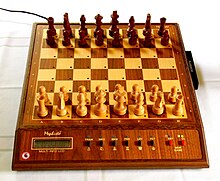Mephisto (chess computer)
This article includes a list of general references, but it lacks sufficient corresponding inline citations. (December 2010) |





Mephisto was a line of chess computers sold by Hegener & Glaser (H+G). In addition to integrated travel and sensory computers, they also sold a line of modular electronic autosensory boards (Modular, Exclusive, München, and Bavaria) which could accept different program, processor, and display modules.
Its strongest software was written by Richard Lang, who later ported it to personal computers as Psion and ChessGenius. Lang's Mephisto programs won six World Computer Chess Championships (WCCC) from 1984 to 1990. H&G also sold engines licensed from Johan de Koning, Ed Schröder, and Frans Morsch. Different models used different 8-bit, 16-bit and 32-bit processors, including MOS Technology 6502, Motorola 68HC05, Motorola 68000 and others.
Hegener & Glaser and its Mephisto brand were bought in 1994 by Saitek. Their computers currently sold under the Mephisto brand use programs written by Frans Morsch.
Hegener & Glaser (Mephisto)[edit]
- 1969 established in Munich by Manfred Hegener and Florian Glaser for the production of semiconductors
- 1978 the programmers Thomas Nitsche and Elmar Henne came into contact with H+G Thomas Nitsche and Elmar Henne
- 1980 the "Mephisto" Tradename was created, nicknamed Brikett (German for briquette) — the first German Chess Computer — programmed by Thomas Nietsche and Elmar Henne, appeared in stores.
- 1983 Introduction of the Modular system, with the Mobil, Modular, and Exclusive boards and MM I module.
- 1984 with Richard Lang and his Psion chess (Winner of World Microcomputer Chess Championship 1984 in Glasgow) began a long series of World Championship successes.
- 1985 introduction of Lang's first Mephisto module, the Amsterdam 68000
- 1989 over 90% of all chess computers sold in Germany were Mephistos
- 1989 H+G buys "Fidelity Electronics Inc." for ~ 7 Million US $
- 1990 the market for high-priced chess computers collapses. The cause is the growth of high-performance 486 PCs and the availability of newly developed low-cost strong chess software for PCs.
- 1992 H+G shows losses of 28 Million DM
- 1992 Ed Schröder wins with Gideon 3.1 (later sold as Mephisto Risc 2) the open 7. WCCC — ahead of large mainframe computers and special hardware machines
- 1994 H+G is bought by Saitek for ~ 7 Million DM
- 1994 Richard Lang's Genius (Mephisto London) beats Garry Kasparov in the Intel World Chess Grand Prix Turnier in London on a Pentium Processor
- 1997 Manfred Hegener and Ossi Weiner form the company "Millennium 2000 GmbH Hegener & Weiner" and produce the "Millennium Schachpartner 2000", sold at 99 DM
- 2005 Phoenix Chess Systems releases the Resurrection module for existing Mephisto modular boards. The hardware uses a 200 MHz ARM processor to run modern chess engines, resulting in the strongest dedicated chess computer ever created.
- 2007 Phoenix Chess Systems releases an updated module set, the Resurrection II, with a faster 500 MHz XScale processor.
Mephisto Modular System[edit]
Boards:
- Mephisto Mobil (folding magnetic board)
- Mephisto Modular (plastic autosensory board)
- Mephisto Exclusive (40x40 cm wooden autosensory board)
- Mephisto München (50x50 cm wooden autosensory board)
- Mephisto Bavaria (50x50 cm wooden piece recognition board)
Modules:
|
|
|
Tournament machines[edit]
Mephisto sold limited edition versions of Lang's championship winning programs in dedicated boards with upgraded processors, cooling, and memory, similar to the hardware used in the championship tournaments.
- Mephisto TM Roma (68020, 25 MHz)
- Mephisto TM Almeria (68020, 30 MHz)
- Mephisto TM Portorose (68030, 36 MHz)
- Mephisto TM Lyon (68030, 36 MHz)
- Mephisto TM Vancouver (68030, 36 MHz)
- Mephisto TM London (68030, 36 MHz)
- Mephisto Wundermaschine (80486, 66 MHz)
Other chess computers from the manufacturer Hegener & Glaser[edit]
|
|
|
|
